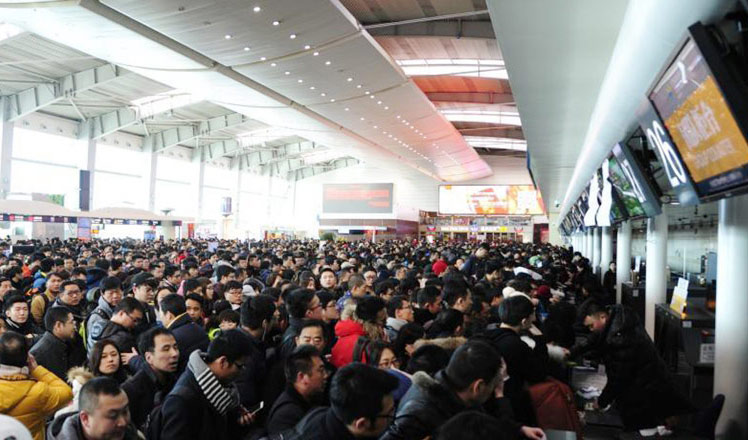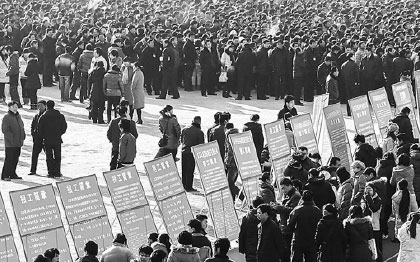Migrant workers bring jobs home
Updated: 2016-02-15 08:03
By Zhulixin in Fuyang, Anhui(China Daily)
|
||||||||
In Anhui province, local governments are encouraging returnees to start companies
As the birthplace of more than 2.8 million migrant workers, Fuyang city in East China's Anhui province is hoping to woo its sons home so they can help develop the local economy.
The model for this planned up-by-the-bootstraps rejuvenation might very well be Wang Zili, 46, owner of a workshop that employs 150 in Fuyang's Linquan county. Wang started the firm in 2012 in the village where he was born. While it's called an electronics company, wicker furniture is also in its product catalog.
Wang, who frequently smiles, says he's still not used to being called boss. "I prefer that people use my name instead of a title, because I think I am still a migrant worker," he said.
In the early 1990s, Wang left his hometown and became a migrant worker. In his first decade away, he took temporary jobs - mostly painting - in Beijing and Shandong and Shaanxi provinces, he said.
At first, Wang just earned 5 yuan ($0.76) a day. Still, "the income was much higher than what I could earn from farming in the countryside", said the father of four.
The Wangs and their children jointly owned 2,000 square meters of agricultural fields in the countryside. Wang said that made it "impossible to feed the family", adding that it was a common dilemma in Linquan, which has suffered from dire poverty for decades.
The county has just 1,800 square kilometers of land to support more than 2.3 million.
"For more than 10 years starting in the 1990s, the Fuyang government encouraged local rural residents to find jobs in cities, for poverty relief purposes," said Ye Luzhong, deputy Party chief of the city. "In the past, more people meant more poverty."
During that time, the government collected information on the companies that were recruiting workers and provided it to rural residents. A free bus carried those who decided to leave Fuyang city, where they could catch trains and long-distance buses.
Ye said the migrant workers have played a very important role - not only in the development of the places where they have worked, but also of their hometown, "since they bring back money".
"Nowadays, more people means more opportunities," said Ye.
In 2004, Wang walked into an electronics company in Taizhou city in Zhejiang province. The firm's main product was a small light often used in children's shoes.
Wang discovered that while the lights were very easy to assemble, the company often was short of workers. He made a proposal to the boss, saying he could bring the materials back to his hometown and return the finished products to the company.
With that, Wang returned to Linquan in 2005 and hired villagers, many of whom were women, seniors and the disabled left behind by men working in the cities.
Wang said that after Spring Festival, he would move his company's operations from his own home to an industrial zone built nearby last year specifically for the businesses of returned migrant workers. The factory will be provided to Wang free of charge for the first three years. More than 10 other firms also would move there.
Ye, the Party official, said people such as Wang constitute hope for the future development of the city's far-flung rural areas. "The next five years will be key to the city's urbanization process," Ye said. "We have no choice but to rely on returning migrant workers."
The returnees "are hardworking and they will not likely leave the place again once they have their own careers in their hometown", Ye said.
zhulixin@chinadaily.com.cn
|
Migrant workers attend a job fair in Xuyi county, Jiangsu province, on Sunday. The county offers many opportunities, hoping to attract migrant workers who would usually go to big cities to seek jobs after Spring Festival. Zhou Haijun / Xinhua |
- ASEAN wants good US-China relations
- Jury finds NYPD's Liang guilty in fatal shooting
- Major powers agree on plan to break Syria deadlock
- Munich Security Conference opens amid concerns
- General strike against pension reform brings Greece to standstill
- Madrid airport sounds alarm after bomb threat on Saudi plane

 Chinese Lunar New Year marked in central London
Chinese Lunar New Year marked in central London
 Top 10 most difficult cities in China to get a taxi
Top 10 most difficult cities in China to get a taxi
 Sichuan opera charms British children
Sichuan opera charms British children
 Thousands of passengers stranded at Dalian airport
Thousands of passengers stranded at Dalian airport
 Visitors enjoy cherry blossoms in South China's Guangdong
Visitors enjoy cherry blossoms in South China's Guangdong
 Sichuan opera charms British children
Sichuan opera charms British children
 Clash of civilizations in a fairytale village
Clash of civilizations in a fairytale village
 Cultural exhibition opens at Tibet Museum in Lhasa
Cultural exhibition opens at Tibet Museum in Lhasa
Most Viewed
Editor's Picks

|

|

|

|

|

|
Today's Top News
National Art Museum showing 400 puppets in new exhibition
Finest Chinese porcelains expected to fetch over $28 million
Monkey portraits by Chinese ink painting masters
Beijing's movie fans in for new experience
Obama to deliver final State of the Union speech
Shooting rampage at US social services agency leaves 14 dead
Chinese bargain hunters are changing the retail game
Chinese president arrives in Turkey for G20 summit
US Weekly

|

|









